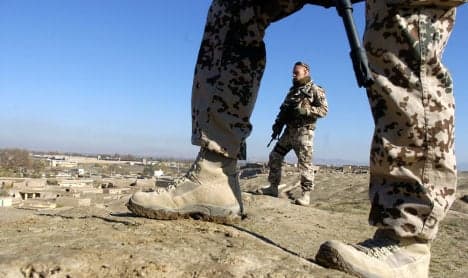De Maizière says Germany must pull its weight abroad militarily

German Defence Minister Thomas de Maizière Thursday said his country should be prepared to pull its weight militarily abroad, taking part in international operations even when Berlin's interests are not directly at stake.
"When one looks around the world where soldiers - from New Zealand, Canada, Australia, the Netherlands, Norway - are deployed and why they are there, then one comes to the conclusion that it's a privilege and honour for these countries to act as part of the international community, taking on international responsibilities," de Maizière said in a radio interview.
"We must also ask ourselves such questions even when German interests are not directly at stake," he told broadcaster Deutschlandfunk.
"We are a large and important country and want to be a large and important country, we want to retain influence in the world, and therefore, when it comes to it, and when we consider it right, we too should take on international responsibilities, not because we are forced to but because we want to," he added.
De Maizière on Wednesday outlined a large-scale shake-up in the armed forces which will see overall numbers slashed in a bid to improve efficiency.
But he also said that some 10,000 soldiers will in future be available on a permanent basis for intervention abroad, compared to just 7,000 today.
Jürgen Trittin, a leader of the opposition Green party which once advocated German neutrality, said de Maiziere was only saying openly what everyone knew.
Trittin warned, however, against the temptation Germany might have "to protect economic interests" abroad.
A member of the NATO western alliance, Germany long resisted foreign military involvement because of dark memories linked to World War II when German troops brief conquered much of Europe.
Over the past decade or so, however, Germany has increasingly sent troops abroad to act as peacekeepers, for example in the former Yugoslavia.
It has also taken part in UN-mandated operations, such as in Lebanon, and in NATO military operations, as in Afghanistan where it provides the third-largest foreign troop contingent.
But in recent months, many of Germany's closest allies have questioned the dependability of Chancellor Angela Merkel's centre-right coalition after it abstained from a UN resolution paving the way for military action against the regime of Libyan dictator Muammar Qaddafi.
Facing a barrage of criticism both at home and abroad, German Foreign Minister Guido Westerwelle said the undertaking was simply too risky for Berlin to get involved.
AFP/The Local/mry
Comments
See Also
"When one looks around the world where soldiers - from New Zealand, Canada, Australia, the Netherlands, Norway - are deployed and why they are there, then one comes to the conclusion that it's a privilege and honour for these countries to act as part of the international community, taking on international responsibilities," de Maizière said in a radio interview.
"We must also ask ourselves such questions even when German interests are not directly at stake," he told broadcaster Deutschlandfunk.
"We are a large and important country and want to be a large and important country, we want to retain influence in the world, and therefore, when it comes to it, and when we consider it right, we too should take on international responsibilities, not because we are forced to but because we want to," he added.
De Maizière on Wednesday outlined a large-scale shake-up in the armed forces which will see overall numbers slashed in a bid to improve efficiency.
But he also said that some 10,000 soldiers will in future be available on a permanent basis for intervention abroad, compared to just 7,000 today.
Jürgen Trittin, a leader of the opposition Green party which once advocated German neutrality, said de Maiziere was only saying openly what everyone knew.
Trittin warned, however, against the temptation Germany might have "to protect economic interests" abroad.
A member of the NATO western alliance, Germany long resisted foreign military involvement because of dark memories linked to World War II when German troops brief conquered much of Europe.
Over the past decade or so, however, Germany has increasingly sent troops abroad to act as peacekeepers, for example in the former Yugoslavia.
It has also taken part in UN-mandated operations, such as in Lebanon, and in NATO military operations, as in Afghanistan where it provides the third-largest foreign troop contingent.
But in recent months, many of Germany's closest allies have questioned the dependability of Chancellor Angela Merkel's centre-right coalition after it abstained from a UN resolution paving the way for military action against the regime of Libyan dictator Muammar Qaddafi.
Facing a barrage of criticism both at home and abroad, German Foreign Minister Guido Westerwelle said the undertaking was simply too risky for Berlin to get involved.
AFP/The Local/mry
Join the conversation in our comments section below. Share your own views and experience and if you have a question or suggestion for our journalists then email us at [email protected].
Please keep comments civil, constructive and on topic – and make sure to read our terms of use before getting involved.
Please log in here to leave a comment.